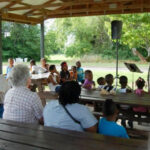In the first weekend of the 2021 NCAA men’s basketball tournament, 15-seeded Oral Roberts University (ORU) squeaked past No. 2 Ohio State, breaking more than 95 percent of ESPN’s fantasy tournament brackets on the first day. Two days later, ORU came back to beat No. 7 Florida and become only the second 15-seed in history to make it to the Sweet 16.
“Oral Roberts stuns men’s basketball tournament opponents, captures national attention,” Fox reported. “Oral Roberts is the unlikely school to spark March’s wildest celebration yet,” Sports Illustrated said. “What and who is Oral Roberts? Meet the NCAA men’s basketball tournament Cinderella team and school,” reported USA Today.
This year’s favorite March Madness underdog is a Christian college in Tulsa, Oklahoma, named for Pentecostal evangelist Oral Roberts. But while Roberts preached prosperity theology, the coach leading his school’s winning basketball team does not.
Head coach Paul Mills tweets Spurgeon quotes, has a master’s degree from Dallas Theological Seminary, and says that hearing the Bible misused—especially in sports, where winning is often connected to God’s blessings—makes him “go bonkers.”
TGC asked him about Big God theology, growing up poor, why he took a job at Baylor months after one player murdered another, and more.
You grew up a pastor’s kid in inner-city Houston. How did you get started with basketball?
In America, basketball is the sport of the poor. My dad was a pastor and made $100 a week. I would always want new Air Jordan shoes, and my mom would say, “We cannot eat Air Jordans. We can only buy things we can eat.” I couldn’t afford a baseball bat and glove and cleats and helmet. But I could run down to the end of the street and play with 15 other kids and one basketball.
James Naismith, who created the sport, went to seminary. He wanted “to win men for the Master through the gym.” That was my goal, too. When I was 19, I wanted to share the gospel, and I found if I said, “Would you guys show up to a Bible study?” nobody showed up. But if I said, “We’re going to open the gym [at the church] and play basketball,” we’d have 50 kids there. Then I could gather them for 5 to 10 minutes. Basketball was the carrot that allowed you to invest in their lives.
James Naismith, who created the sport, wanted ‘to win men for the Master through the gym.’
After college, you coached high school for six years, then spent a year at Rice University. The next year you began working at Baylor University, just weeks after one of the basketball players shot and killed a teammate. The NCAA investigated the program and found it riddled with drug use and illegal payments to players. All scholarship players were allowed to transfer, and both the university and the NCAA imposed penalties that left Baylor’s program in ruins. What did you think when replacement head coach Scott Drew asked you to step in?
The answer was immediately, “No, thank you.” Then Scott said, “I heard you were a Christian. Would you at least pray about it?” I replied, “I will, but I’m 99 percent sure God is going to say no, too.”
After about a week, I really felt compelled to go there, so I did. My second year, we won only one game in conference play. Twelve years later, during my last year, we were No. 1 in the country. I had a front-row seat to the blueprint of what needs to happen to help a college basketball program.
One key is the “care factor.” If it’s important to you, you’re probably going to do it with a level of diligence—especially if you’re using God-given abilities for God-given reasons. I talked about the care factor so much that my friends were like, “You need to develop an acronym.” So when I came here [to ORU], I did. It’s CARE: Christ better be first, reflected in your Attitude, then Relentless Effort.
Last summer, you graduated from Dallas Theological Seminary with a master’s in biblical and theological studies. But you aren’t going into vocational ministry. So why does a basketball coach need a theology degree?
The kinds of questions you get from players after practice aren’t “How do I shoot a free throw better?” or “What do I do on this pick-and-roll?” It’s “Coach, my dad hit my mom last night, and I’m going to see him later tonight. What should I do?”
Regardless of job title, you’re always ministering to somebody. And the more you know Scripture, the better equipped you’re going to be for whatever is needed. Basically, the more I invested in myself, the more I could help the players I was around.
Did you notice a difference?
A huge difference. It was a game-changer for me. One big thing was learning Greek—now I can read the text in its original language and have a deeper understanding of what’s being said. Without a sound hermeneutic, it’s easy to disillusion people and throw them off-kilter for a long time.
For example, I have a heart for Jehovah’s Witnesses, and I’ll go to the park whenever I know they’re there. I visit with them. I asked a lady in her 70s, “How did you come to be a Jehovah’s Witness?” She said she was Catholic, but after her husband died she went to the priest and he told her, “God wanted your husband.” She thought, God didn’t think about what I wanted? What my daughter wanted? So she switched and found something else.
That one comment caused this lady to follow something else that changed her life. Obviously, none of this is possible without the moving of the Holy Spirit to keep us on the right course. But it makes me realize how important it is to be accurate in our language. Randomly saying stuff can cause serious, real pain.
In the athletic world, there’s a lot of verses taken out of context, as well as distorted prosperity theology. How do you handle that?
I go bonkers. People run around, thinking God is a genie in a bottle—“If I don’t get my wishes granted to me, something must be wrong.” I don’t do well with people quoting Philippians 4:13 (“I can do all things through him who strengthens me”). That doesn’t mean you can bench 500 pounds. It doesn’t mean you can jump off a building and fly if you simply “claim” the verse. Paul is saying, “Hey, I learned how to deal with a having a lot and having less. I can handle it all because Christ is strengthening me.”
I listen to Psalm 118 before every game, about 20 minutes before tip-off, on the Dwell app. The opening statement is, “Give thanks to the LORD, for he is good.” He is good whether we win or lose. If we lose, it doesn’t mean that other coach prayed more.
I do find myself explaining the text to our players. We lost a game last year, and I had players saying, “How come we lost? We’re a Christian school that tries to honor God.” I told them that has nothing to do with it. In the same way, screwing up a financial statement has nothing to do with God. You don’t have good or bad days based on whether you spent enough time in prayer or had enough faith.
I also do chapels on game days, and I’m constantly pointing them to Jesus. In 100 years, none of us is going to be here. As good as we may think we are at basketball, it’s really not that significant. As much as I admire Martin Luther King Jr., there are not even two people who gather on Sunday to celebrate him. But 120 million gather together to celebrate Jesus.
Isaiah is clear: God does not share his glory. There’s only one name by which man might be saved. We need to be sure we’re about that. If all you’re doing is talking about a rubber ball, you’re failing these guys.
Recent years have seen a resurgence in evangelicalism of what some call Big God theology. Why is it important to grasp the sovereignty of God? What practical difference does it make?
To the holy, all things are holy (Titus 1:15). If God has created an opportunity and ability for you to do something, you should do it well. If you’re going to run around as a Christian and say, “I represent God”—OK, how well do you think you should do things? You should probably strive to be pretty good at it. It ought to be serious to you because you realize you have been granted a stewardship and you need to honor it.
You do not honor it by being sloppy, by not being diligent. I tell my guys, “You been gifted with something. Not everybody is 6’10”. But I need to know you’re going to try to get the most out of what you have, because I’m going to try to get the most out of you.”
I’m all about gathering a group of young men whose desire is to honor God through their gift of basketball. We have accumulated a group of guys of whom that is true. They are representing themselves and their families. And we’re happy to do it on a national stage like the NCAA tournament presents.
You can watch the ORU Golden Eagles take on No. 3 University of Arkansas on Saturday, March 27.
Involved in Women’s Ministry? Add This to Your Discipleship Tool Kit.
 We need one another. Yet we don’t always know how to develop deep relationships to help us grow in the Christian life. Younger believers benefit from the guidance and wisdom of more mature saints as their faith deepens. But too often, potential mentors lack clarity and training on how to engage in discipling those they can influence.
We need one another. Yet we don’t always know how to develop deep relationships to help us grow in the Christian life. Younger believers benefit from the guidance and wisdom of more mature saints as their faith deepens. But too often, potential mentors lack clarity and training on how to engage in discipling those they can influence.
Whether you’re longing to find a spiritual mentor or hoping to serve as a guide for someone else, we have a FREE resource to encourage and equip you. In Growing Together: Taking Mentoring Beyond Small Talk and Prayer Requests, Melissa Kruger, TGC’s vice president of discipleship programming, offers encouraging lessons to guide conversations that promote spiritual growth in both the mentee and mentor.

































